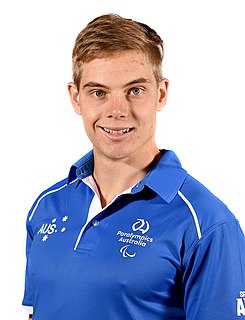
Gregory Stephen Smith, OAM is an Australian Paralympic athlete and wheelchair rugby player who won three gold medals in athletics at the 2000 Summer Paralympics, and a gold medal in wheelchair rugby at the 2012 Summer Paralympics, where he was the flag bearer at the opening ceremony.
T51 is disability sport classification for athletics. The class includes people with a number of different types of disabilities including spinal cord injuries and cerebral palsy. Similar classifications are T52, T53, T54 and T55. It is for sportspeople with minimal upper body function who use a wheelchair, spinal cord injury class F1 and Les Autres class LAF1.
T52 is disability sport classification for disability athletics. People in this class have good shoulder and upper body control, but lack fine motor skills in their arms and hands. They have no to limited trunk and leg function. The class includes people with a number of different types of disabilities including spinal cord injuries. Similar classifications are T51, T53 and T54.

Singapore competed at the 1988 Summer Paralympics in Seoul, South Korea. Eight competitors from Singapore competed in a total of two sports, and did not place in the medal table.

James Michael Apsley Turner, is an Australian Paralympic athlete and soccer player with cerebral palsy. He has represented Australia as part of the Australia Paralympic soccer team, the ParaRoos, and was its player of the year in 2013. At the 2016 Summer Paralympics, he won the Men's 800m T36 in a world record time of 2:02.39. At the 2017 World Para Athletics Championships in London, he won three gold medals; he followed this up with two gold medals at the 2019 World Para Athletics Championships in Dubai and a gold and one silver medal at the 2020 Paralympic Games in Tokyo.

Uganda sent a delegation to compete at the 2016 Summer Paralympics in Rio de Janeiro, Brazil, from 7 to 18 September 2016. This was the eighth appearance of the country in the Summer Paralympic Games after it debuted forty-four years prior at the 1972 Heidelberg Paralympics. Athletics track runner David Emong was the sole athlete representing Uganda in Rio de Janeiro. He took part in the men's 400 metres T45–47 competition on 8 September and did not qualify for the finals because he was fifteenth overall. Emong participated in the men's 1500 metres T45–46 event later that day and he took Uganda's first medal in Paralympic competition by coming second in the final.

Cape Verde sent a delegation to compete at the 2016 Summer Paralympics in Rio de Janeiro, Brazil, from 7 to 18 September 2016. This was the nations' fourth appearance at a Summer Paralympic Games since it made its debut at the 2004 Athens Summer Paralympics. Cape Verde was represented by two athletes in Rio de Janeiro: sprinter Gracelino Barbosa and javelin thrower Márcio Fernandes, who qualified for the Games by meeting the qualification standards of their events. Barbosa won the country's first Paralympic medal with his third-place finish in the men's 400 metres T20 competition and Fernandes came ninth in the F44 men's javelin event.

Botswana sent a delegation to compete at the 2016 Summer Paralympics in Rio de Janeiro, Brazil, from 7 to 18 September 2016. This was the country's second time competing at a Summer Paralympic Games after making its debut at the 2004 Summer Paralympics. Botswana was represented by one athlete, Keatlaretese Mabote, a short-distance sprinter. He competed in one event, the men's 400 metres T12 competition, where he was eliminated in the heat stages because he was third in his heat and only the top two participants in a heat progressed to the semi-finals.
The Men's 100m athletics events for the 2016 Summer Paralympics take place at the Estádio Olímpico João Havelange from September 8 to September 16, 2016. A total of 16 events were contested over this distance, and entry was open in 19 classifications.
The Men's 1500m athletics events for the 2016 Summer Paralympics took place at the Estádio Olímpico João Havelange from 8 to 17 September. A total of six events were contested over this distance for eight different classifications.
The Men's 400m athletics events for the 2016 Summer Paralympics take place at the Estádio Olímpico João Havelange from September 8 to September 16, 2016. A total of 15 events were contested over this distance for 19 different classifications.
The Men's 200m athletics events for the 2016 Summer Paralympics take place at the Estádio Olímpico João Havelange from September 8 to September 16, 2016. A total of 15 events were contested over this distance for 19 different classifications.
The Women's 400m athletics events for the 2016 Summer Paralympics take place at the Estádio Olímpico João Havelange from 8 September to 17 September 2016. A total of 12 events were contested over this distance for 15 different classifications.
The T35 category is for ambulant athletes with cerebral palsy. The typical T35 athlete may need assistive devices for walking. The athlete may have sufficient function to run but demonstrates poor balance.
The T51 category is for wheelchair athletes having spinal cord injuries, with mild weakness in shoulders, limited ability in straightening elbows and wrist function, and no finger, trunk or leg function.
The T52 category is for wheelchair athletes with damage to spinal cord in the higher parts of the back, substantially impaired or no trunk function, and minimal or no leg function. Pushing power comes from elbow extensions, and appears close to normal except for use of modified gloves to compensate for grip.
The T44 category is for athletes who have a single below knee amputation or who can walk with moderately reduced function in one or both legs.
The T47 category is for athletes who have a single below elbow or wrist amputation or similar disability, with normal function in both legs.
The T53 category is for wheelchair athletes with normal use of arms and hands, no or limited trunk function, and no leg function.





